二级口语考试等说明2013
二年级口语考试方案
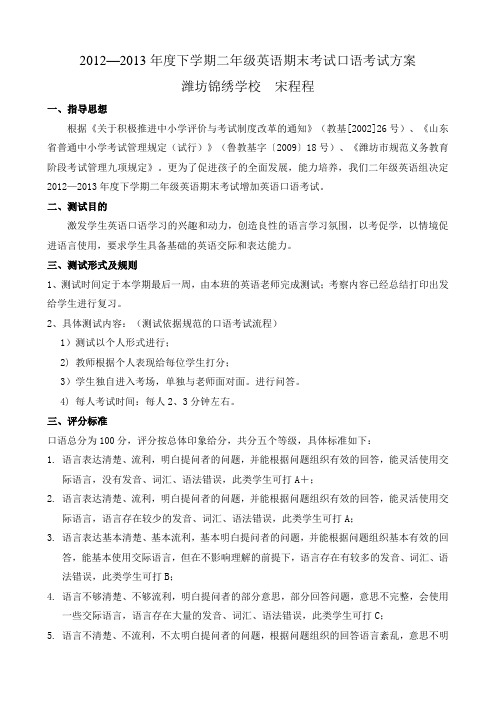
2012—2013年度下学期二年级英语期末考试口语考试方案潍坊锦绣学校宋程程一、指导思想根据《关于积极推进中小学评价与考试制度改革的通知》(教基[2002]26号)、《山东省普通中小学考试管理规定(试行)》(鲁教基字〔2009〕18号)、《潍坊市规范义务教育阶段考试管理九项规定》。
更为了促进孩子的全面发展,能力培养,我们二年级英语组决定2012—2013年度下学期二年级英语期末考试增加英语口语考试。
二、测试目的激发学生英语口语学习的兴趣和动力,创造良性的语言学习氛围,以考促学,以情境促进语言使用,要求学生具备基础的英语交际和表达能力。
三、测试形式及规则1、测试时间定于本学期最后一周,由本班的英语老师完成测试;考察内容已经总结打印出发给学生进行复习。
2、具体测试内容:(测试依据规范的口语考试流程)1)测试以个人形式进行;2) 教师根据个人表现给每位学生打分;3)学生独自进入考场,单独与老师面对面。
进行问答。
4) 每人考试时间:每人2、3分钟左右。
三、评分标准口语总分为100分,评分按总体印象给分,共分五个等级,具体标准如下:1.语言表达清楚、流利,明白提问者的问题,并能根据问题组织有效的回答,能灵活使用交际语言,没有发音、词汇、语法错误,此类学生可打A+;2.语言表达清楚、流利,明白提问者的问题,并能根据问题组织有效的回答,能灵活使用交际语言,语言存在较少的发音、词汇、语法错误,此类学生可打A;3.语言表达基本清楚、基本流利,基本明白提问者的问题,并能根据问题组织基本有效的回答,能基本使用交际语言,但在不影响理解的前提下,语言存在有较多的发音、词汇、语法错误,此类学生可打B;4.语言不够清楚、不够流利,明白提问者的部分意思,部分回答问题,意思不完整,会使用一些交际语言,语言存在大量的发音、词汇、语法错误,此类学生可打C;5.语言不清楚、不流利,不太明白提问者的问题,根据问题组织的回答语言紊乱,意思不明确,不会使用交际语言,语言存在大量的发音、词汇、语法错误,此类学生可打D。
2013年9月二级听力考试真题分析报告
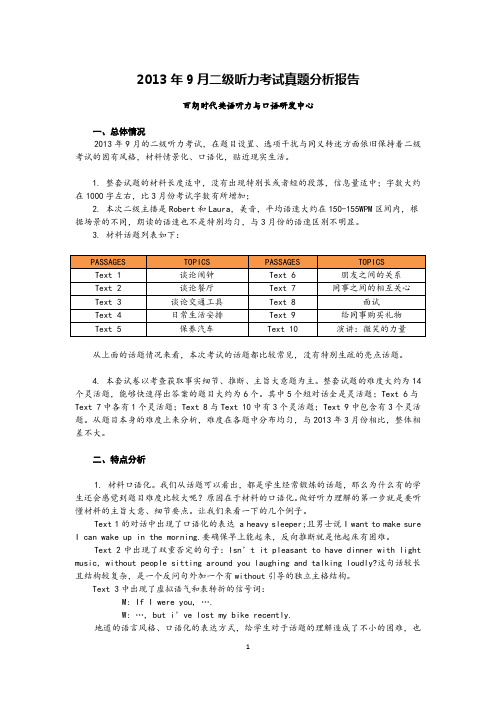
2013年9月二级听力考试真题分析报告百朗时代英语听力与口语研发中心一、总体情况2013年9月的二级听力考试,在题目设置、选项干扰与同义转述方面依旧保持着二级考试的固有风格,材料情景化、口语化,贴近现实生活。
1. 整套试题的材料长度适中,没有出现特别长或者短的段落,信息量适中;字数大约在1000字左右,比3月份考试字数有所增加;2. 本次二级主播是Robert和Laura,美音,平均语速大约在150-155WPM区间内,根据场景的不同,朗读的语速也不是特别均匀,与3月份的语速区别不明显。
3. 材料话题列表如下:从上面的话题情况来看,本次考试的话题都比较常见,没有特别生疏的亮点话题。
4. 本套试卷以考查获取事实细节、推断、主旨大意题为主。
整套试题的难度大约为14个灵活题,能够快速得出答案的题目大约为6个。
其中5个短对话全是灵活题;Text 6与Text 7中各有1个灵活题;Text 8与Text 10中有3个灵活题;Text 9中包含有3个灵活题。
从题目本身的难度上来分析,难度在各题中分布均匀,与2013年3月份相比,整体相差不大。
二、特点分析1. 材料口语化。
我们从话题可以看出,都是学生经常锻炼的话题,那么为什么有的学生还会感觉到题目难度比较大呢?原因在于材料的口语化。
做好听力理解的第一步就是要听懂材料的主旨大意、细节要点。
让我们来看一下的几个例子。
Text 1的对话中出现了口语化的表达 a heavy sleeper;且男士说I want to make sure I can wake up in the morning.要确保早上能起来,反向推断就是他起床有困难。
Text 2中出现了双重否定的句子:Isn’t it pleasant to have dinner with light music, without people sitting around you laughing and talking loudly?这句话较长且结构较复杂,是一个反问句外加一个有without引导的独立主格结构。
2013考研《英语二》小作文范文及解析

2013考研《英语二》小作文范文及解析如下:Section IV Writing47 WritingSuppose your class is to hold a charity sale for kids in need of help. Write your classmates an email to1) inform them about the details and2) encourage them to participate 100 words use Li Ming. Don't write your address.(10 points)【范文及解析】Dear Classmates,I am writing to notify you of a charity sale our class will oganize. The detailed arrangements are as follows.This event will be held in the playground of our university on May 10, 2013, and it will start at 7 and end at 10 o’clock in the evening. At the opening ceremony, our Monitor will make clear that the purpose of the sale is to help children who have dropped out of shool because their family cannot afford their tuitioin.Then is the time for donating activity.Giving your love is a virtue, so I really appeal to all the students to take part in this event and I will be grateful if you come and give your donation.Sincerely yours,Li Ming2013年英语二小作文解析在2012年所有的面授及课中,跨考老师均预测2013年英语(二)小作文80%的可能性是考察书信。
2013年普通话考试

2013年普通话考试
2013年普通话考试是指中国的普通话水平测试,也叫普通话水平测试,是中国国家语言文字工作委员会、国家汉办主办的测试。
每年都会有一次,在全国范围内进行。
根据2013年的考试大纲,考试内容主要包括语音、词汇、语法、阅读理解和口语交际等方面。
考试难度分为初级水平、中级水平和高级水平,考生可根据自己的实际水平参加对应等级的考试。
2013年的考试试题主要包括语音测试(如音节、声调、发音等)、词语辨析、填空、情景对话等。
考生需要在规定的时间内完成试题,并按要求进行朗读或回答问题。
通过普通话考试可以评定考生的普通话水平,对于学习和工作都有一定的指导意义。
考生可以根据测试结果,了解自己的语言表达能力,进一步提高普通话水平。
剑桥二级口语考试重点

剑桥二级口语考试重点剑桥二级口语考试一共分为四个部分,分别为:第一部分( Find the Difference):给出两幅图片,这两幅图片会有几处不同,需要考生用英语描述出来,常用句型为 There be 句型;第二部分(Picture Story):有四幅图,要求考生在考官的指导下能够用英语描述出四幅图的故事,描述的时候应该用一般现在进行时和一般现在时的时态;第三部分 (Odd-one-out):考官会给出四组图,每组图有四幅图片,要求考生用英语指出每一组中不同的一项,并说出原因。
考生回答的时候应该注意要分两点来回答,第一点指出哪一项是不同的,第二点说出原因;第四部分:考生会随机给学生提问,考察学生的英语听力、口语、应变能力及常用交际句型的掌握程度。
下面是一些常用的句型:一、考前问候:考生进入考场后,一般考官会和考生简单的做英语交流,考官会提出一下问题: (1) Hello,My name is Bill.(2)How old are you? 这时考生应当回答 (1) Hello,I'm Tom.(2)I'm 9 years old.*注:此时考官还有可能会追问“ Are y ou 9?(你是 9 岁吗)”,考生应当听懂,并回答“Yes,it is . ”二、第一部分 Find the DifferenceExaminer(考官): Look at these pictures.They look the same,but some things are different. What other different things can you see?Students(考生): There is a ............in picture1,but there is a ...........in picture2.三、第二部分 Picture StoryExaminer(考官): These pictures show a story .Look at the picture first.Now you tell the stroy.(考官会提出一些问题引导考生来回答 )Students(考生):考生回答的时候应该用一般现在进行时和一般现在时态。
新编大学英语2口语考试材料及翻译
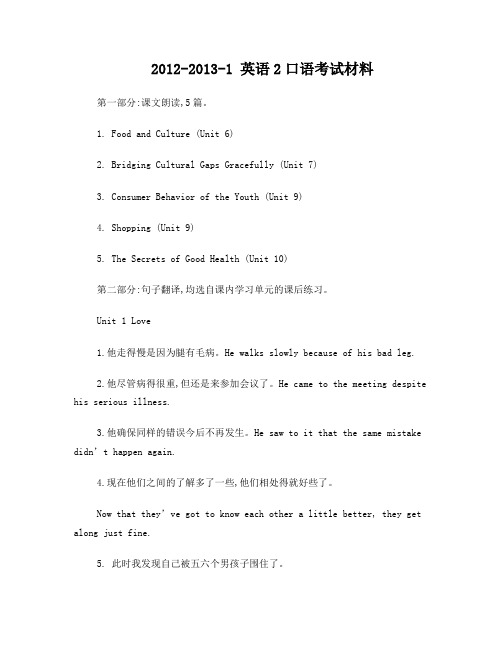
2012-2013-1 英语2口语考试材料第一部分:课文朗读,5篇。
1. Food and Culture (Unit 6)2. Bridging Cultural Gaps Gracefully (Unit 7)3. Consumer Behavior of the Youth (Unit 9)4. Shopping (Unit 9)5. The Secrets of Good Health (Unit 10)第二部分:句子翻译,均选自课内学习单元的课后练习。
Unit 1 Love1.他走得慢是因为腿有毛病。
He walks slowly because of his bad leg.2.他尽管病得很重,但还是来参加会议了。
He came to the meeting despite his serious illness.3.他确保同样的错误今后不再发生。
He saw to it that the same mistake didn’t happen again.4.现在他们之间的了解多了一些,他们相处得就好些了。
Now tha t they’ve got to know each other a little better, they get along just fine.5. 此时我发现自己被五六个男孩子围住了。
Then I found myself surrounded by half a dozen boys.6.在这幸福的时刻,我向你致以最美好的祝愿。
I send you my best wishes on this happy occasion. Unit 2 Communication Problem7.昨天我去牙科医生那儿将我的一颗蛀牙拔掉了。
I went to the dentist yesterday to have a bad/decayed tooth pulled out.8.事物的发展从根本上讲是由内因决定的。
2013新课标英语考试说明

2013新课标英语考试说明Ⅰ、考试性质普通高等学校招生全国统一考试是由合格的离中华业生和具有同等学力的考生参加的选拔性考试。
高等学校根据考生的成绩,按已确定的招生计划,德、智、体全面衡量,择优录取。
因此.离考应有较高的信度、效度,适当的难度和必要的区分度。
Ⅱ.考试的内容和要求根据普通高等学校对新生文化素质的要球,依据中华人民共和国教育部2003年颁布的《普通高中课程方案(实验)》和《普通高中英语课程标准(实验)》,确定本学科考试内容。
考核目标与要求一、语言知识要求考生掌握并能运用英语语音、词汇、语法基础知识以及所学功能意念和话题(见附录1至附录5),要求词汇量为3500左右.二、语言运用1.听力要求考生能听懂所熟悉话题的简短独白和对话。
考生应能:(1)理解主旨和要义(2)获取具体的、事实性信息(3)对所听内容作出推断(4)理解说话者的意图、观点和态度(5)阅读(6)要求考生能读懂书、报、杂志中关于一般性话题的简短文段以及公告、说明、广告等,并能从中获取相关信息。
考生应能:(7)理解主旨和要义(8)理解文中具体信息(9)根据上下文推断生词的词义(10)做出判断和推理(11)理解文章的基本结构(12)理解作者的意图、观点和态度(13)写作(14)要求考生根据题式进行书面表达。
考生应能:(15)清楚、连贯地传递信息,表达意思(16)有效的运用所学语言知识(17)口语(18)要求考生根据题式进行口头表达。
考生应能:(19)询问或传递实施性信息,表达意思和想法(20)做到语音、语调自然(21)做到语言运用得体(22)使用有效的交际策略、附录1 语音项目表1.基本读音(1)26个字母的读音(2)元音字母在重读音节中的读音(3)元音字母在轻读音节中的读音(4)元音字母组合在重读音节中的读音(5)辅音字母组合的读音。
雅思口语part2高分示范答案-...

雅思口语part2高分示范答案--Describeapersonwhoyouthinkisfashion我们都知道备考雅思口语需要在平时积累多一些素材,并且多多参考别人的优秀范文,下面小编给大家带来雅思口语part2高分示范答案--Describe a person who you think is fashion。
雅思口语part2高分示范答案--Describe a person who you think is fashionYou should sayWho the personis?How you knowthe person?Why you think he/she isfashion?Liu Wen, is a Chinese fashion model. She is the first model of East Asian descent to walk the Victoria's Secret Fashion Show. In 2010, she became the first spokesmodel of Asian descent for Estée Lauder. In 2012, The New York Times named her "China’s first bona fide supermodel". In 2013, she became the first Asian model to ever make Forbes magazine's annual highest-paid models list.In an April 2014 article about social media's rise in the fashion industry, American Vogue remarked that she had "by far, the biggest social-media audience of any model". dubbed her as the first ever Asian "New Supermodel" in July 2014. And in October of the same year, Liu became the first person in the world to showcase an Apple Watch on a magazine cover when she graced Vogue China's November 2014 issue. Liu started her modeling career in 2005 when she entered the New Silk Road World Model Contest, a contest previously won by international cover girl Du Juan. Although she did not win the competition, Liu soon began working full-time as a model,eventually becoming a national success story after working with Chinese fashion magazines like Vogue and Harper's Bazaar. I love her changeful style and there is no wonder that she has so many followers and fans.雅思口语话题范例:A school friend雅思口语指导:经典雅思口语话题回答范例这道雅思口语话题难倒了不少同学,下面我们来说一说该题的解题思路,帮助大家顺利过关。
2013新课标英语2篇

2013新课标英语第一篇2013新课标英语考试是一场全面评估学生英语水平的重要考试。
这场考试的题目广泛而多样,涵盖了听力、口语、阅读和写作等方面。
这篇文章将为大家介绍一些关于2013新课标英语考试的重要信息。
首先,听力部分是2013新课标英语考试的第一部分。
考生需要在听到录音后回答一些与录音内容相关的问题。
这部分考试主要考察的是考生的听力理解能力和应对能力。
因此,考生在考试前应该多听一些英语录音,培养自己的英语听力技巧。
考生还应该尽量提高自己的注意力,以便更好地理解录音内容。
第二,口语部分是2013新课标英语考试的第二部分。
考生需要在规定的时间内回答一些针对特定话题的问题。
这部分考试主要考察的是考生的口语表达能力和思维能力。
因此,考生在备考口语部分时应该多练习口语,提高自己的口语流利度和表达能力。
考生还应该多思考一些与话题相关的问题,以便更好地回答考试问题。
第三,阅读部分是2013新课标英语考试的第三部分。
考生需要阅读一些英语文章,并回答与文章内容相关的问题。
这部分考试主要考察的是考生的阅读理解能力和分析能力。
因此,考生在备考阅读部分时应该多读一些英语文章,培养自己的阅读能力和理解能力。
考生还应该注意提高自己的分析能力,以便更好地回答考试问题。
最后,写作部分是2013新课标英语考试的最后一部分。
考生需要根据所给的题目和要求,完成一个英语写作任务。
这部分考试主要考察的是考生的写作能力和思维能力。
因此,考生在备考写作部分时应该多练习写作,提高自己的写作水平和表达能力。
考生还应该多思考一些与写作题目相关的问题,以便更好地完成考试任务。
以上是关于2013新课标英语考试的一些重要信息。
希望考生们能够在备考过程中认真准备,取得好成绩。
祝大家顺利通过考试!第二篇2013新课标英语考试在当年举行,考试题目依然广泛而多样,覆盖了听力、阅读、写作等方面。
这篇文章将为大家提供一些备考2013新课标英语考试的建议。
首先,考生应该合理规划备考时间。
2013级大学英语1-口语考试试题-教师版

2013级大学英语1-口语考试试题-教师版2013级大学英语(1)口语考试试题(教师版)评分标准: 1.讨论小组成员论点鲜明,论证有力.(50%)2.讨论小组成员互动丰富,衔接连贯自然.(30%)3.口语表达符合英语表达习惯,语音清晰正确.(20%)4.小组成员口语考试分数依据个人在小组中的表现差异而给分不同.1.What are your ideas about college education? What's the meaning of it? Howshould you study in the college?2.What is the meaning of learning? Why do human beings need to learn? Doeslearning only occur at school? Why do we have a variety of courses at school?What knowledge and skills are necessary for people to survive in the age of information?3.You are now a freshman in college, what’s the ideal university on youropinion? How did you spend during your college life? What do you think about your college life? Talk about your attitudes towards the current college education in China briefly.4.What preparations should be made for college life? How to adapt to the newcollege life? Do you think you have adapted to the new life here?Are there any difficulties in your present life?5.Where are you from? Why did you choose this university? What’s yourmajor? Why did you choose it? Do you think your major will count for your future career?6.Can you describe the likes and dislikes of your parents? Some people say it isnecessary for a child to celebrate birthdays for his or her parents, but some don't think so, what's your idea?7.In a family, who do you think plays the more important role, the mother orthe father (the wife or the husband)? When there are quarrels between your parents, how will you do with it? Why?8.What do you think are the advantages and disadvantages for a child to growup in a big family? Do you think there are any advantages to having a grandparent living with the family? In general, do you think having old people and young people living together creates conflict (or, problems)?9.Could you tell me something about your family? Who does the most shoppingin your family? Who does the most cooking in your family? Who makes the major decisions in the home? What qualities do you expect from a good father and a good mother respectively?10.In your opinion, which is more important, family or career? Why do youthink so? Suppose in the future your life is busy, then how to balance your family and career?11.Do you think you have true friends? What do you think a true friend shouldbe? What kinds of attributes do you pay attention to when you make friends with others? What are three qualities you want in a good friend? What are three qualities you don’t want in a friend?12.Do you think you are lucky enough to meet good people to make friends with?How do you maintain your friendship? If there is distrust between you and your friend, how will you solve this crisis? If one of your friends did something terrible to you, would you forgive him/her?13.Describe a friend you had when you were a child: how you first met, howlong you were friends, what you used to do together, and explain why you liked this person.14.Have you ever found it difficult to make friends with others? What are theefficient ways to make friends? How to make a longtime true friend? What will you do if one of your friends is having a difficult time?15.Is real friendship only confined within the same sex? Someone said thatchildhood friendship rarely lasts into adulthood. What do you think of the point of view? Will real friendship be influenced or altered by time and distance?16.Have you ever heard of the story “The Wolf Is Coming”?Why did ourparents or grandparents tell us the story in our childhood? What values did you get from the story? If you feel liking telling a lie, will you recall the story?Why or why not? Does this story still have any active influence on your present life? Why or why not?17.What is a white lie? What is your attitude toward white lie? Have you evertold a white lie? Under what circumstances do we tell a white lie?18.How do you define honesty? Why is honesty important? Why is honesty sodifficult at times? When is honesty difficult? What would you do if you were cheated?19.What is the opposite of honesty? Why is dishonesty not good? What kind ofproblems does dishonesty cause? Is there difference between dishonesty and lying? What are some common situations when people are sometimes dishonest? How do you feel when you have been dishonest with someone?How do you feel when someone has been dishonest with you?20.How can you be honest and not hurt someone? Is it ever all right to give onlya partial truth? When might it be all right to give only a partial truth?21.Do you think time is very important? Do you think time management isimportant? Would you say you are good at managing your time? Do you think it a good habit to stay up late before an examination?22.Is punctuality important? What are some examples of occasions when it'simportant to be on time? Have you ever been late? Were there any serious consequences when you were late?How do you feel when you are late? How would you feel if the person you were waiting to meet with was not on time?How do you think about someone who is always late?What are some of the excuses that people always use for being late?23.Are you good at organizing time? How do you usually organize time? Do youthink planning is important for time management? Why do you think some people pay to learn time management? Do you think parents should try to teach their children about time management?24.When do you feel time moves fast?When do you feel time moves slowly?Ifyou could go back in time, what would you do?25.Are you planning to find a part-time job to support yourself through college?What are the advantages and disadvantages of doing a part-time job for a student?26.Which is the festival you like most? When is that? What will you do duringthis festival? What is the history of it? (For example, what’s the history of Dragon Boat Festival?)27.Do you think most students make good use of their summer/winter vacation?Why do you think so? What do you often do on summer vacation or winter holidays? Where do you usually go on summer/winter holidays? Who did you go with?28.How will you celebrate Spring Festival? Who will you spend it with? Whichperformances are you looking forward to on the New Year‟s Eve TV program?What are some of your favorite ones of the past?29.If you were to receive a present (not money) for Spring Festival, what presentwould you like to receive? How does Spring Festival these days compare with how it was when you were a child? Do you like it better now or when you were a child? What do you think Spring Festival will be like in the future?Describe Spring Festival as it is celebrated in your family.30.Pick three adjectives that you feel best describe your relationship with yourparents. Explain why you chose those particular words. On a scale of 1 (being the worst) and 10 (be the best), how well do you think your parents did raising you? If you could change one thing about the way they raised you, what would it be?31.Do you think parents should be strict with their children or lenient? Whatare the consequences of being too strict or too lenient? What are the consequences of not being strict or lenient enough?32.What is your favorite Chinese holiday? Which Western holiday mostinterests you? Do you think holidays are very significant? What meanings are expressed by such holidays as National Day, Mid-Autumn Festival, Christmas, Spring Festival and Thanksgiving?33.Describe what qualities you think the ideal teacher must have. What are somequalities you don’t want in a teacher? In Chinese society, do teachers have a high status or a low status? Do you think being a teacher is a good job? Why or why not?34.If you were a teacher, what kind of teacher would you like to become? Is itthe teacher/school’s or the parents’ responsibility to teach a child good morals and behavior? In your opinion, do men or women make better teachers? 35.Do you like western food or Chinese Food? Can you say something aboutwestern fast food and Chinese food styles? What sort(s) of food do you like?(Why?)How often do you eat that? When was the last time you ate that?36.How does your diet affect your health? Do you want to do something aboutyour diet? Talk about your eating habit. You may refer to the following tips: the meals you have every day, the meal you like the most, the food you usually have for each meal, the food you like the most, etc.37.What food did you like (most) when you were a child? Is there any food thatyou liked when you were a child but you don't like now? What types of food do children generally like to eat?38.Who often cooks in your family? Do you like cooking? (Or, do you know howto cook?) What do you like to cook? When you were young, did you learn how to make a meal (= how to prepare food)? Have you ever thought about learning how to cook? Do you ever make dinner for your family? Do you help to do the food shopping at home? Do you usually help your mother/father cook at home?39.Do you like spicy food? (Or is it OK for you to have spicy food?) Are you on adiet? Describe your favorite healthy food. You should say: what it is, when and how often you eat it, how it is made and explain why it is healthy.40.Do you like western fast food? Why or why not? Do you think it is healthy?Do you like McDonald and KFC? Do you often go there? Why are they so famous in China?41.Do you often exercise? Do you think regular physical exercise is important?Why? How can playing sports help us in other aspects of our lives? Talk about a kind of sport. You should say: what it is, whether it is popular and who likes it.42.Are you a basketball fan? Who is your favorite basketball player? Do youprefer watching a football game on TV or at the stadium? Why? Are you a fan of Chinese football teams? Why?43.What sports do you like best?What sports are most popular in your country?What sports and games did you most enjoy playing when you were a child?What role do sports play in people’s life?What are the differences between men and women when choosing their favorite sports?44.What’s your favorite sport? Talk about it: name of the sport, popularity,special equipment, special training or skill, how to play it, why you like it, how often you play it, when and where you play it, whom you often play with, etc.45.How do people maintain good health? What activity that promotes goodhealth? What would you say is a "healthy lifestyle"? List some healthy and unhealthy living habits.46.Do you have worries? What do you worry the most about? What do youusually do when you have worries? How do you express your worries? How do you reassure yourself and others?47.In what situations do you feel stressed? Does stress affect your health habits?If yes how? Do you know any ways of reducing stress? What are they?48.Do you often go to the hospital? Do you think you are healthy? How can youkeep fit according to your own experience? What do you do to keep healthy?49.Are you thinking about the coming winter holiday? Why? How are youfeeling toward the end of the first semester at college? How are you planning your holidays?50.Which holidays do you celebrate? Talk about your plans for the comingholiday. You may refer to the following tips: what weather you expect it to be, where you would spend the holiday, how you would spend the holiday, what your budget is and how you will control it, etc.。
二级口语考试流程

二级口语考试的流程可能因考试机构和地区而有所不同,以下是一个可能的流程:
1.考生在考试开始前需要到达考场,并按照考场指示进行签到和身份验证。
2.考生需要按照考试要求进行自我介绍,包括姓名、出生地、职业、家庭等基本信息。
3.考试开始后,考生将根据考官的指示进行问答环节。
在这个环节中,考生需要就自己卡片上的信息进行提问和回答。
如果卡片上没有某项信息,考生可以表达歉意,并利用自己的背景知识或想象力提供该信息。
4.在问答环节结束后,考官会根据上一轮提问中的交流内容,向两位考生提出更加详细的问题,考生需要根据自己的信息卡片给出个人观点和见解。
5.如果考生完成了信息卡的所有问题,可以用英语对考官说"Excuse me, sir/Madam, we have finished our cards.",然后等待考试结束。
需要注意的是,具体的考试流程可能因考试机构和地区而有所不同。
因此,考生应该仔细阅读考试须知和考场指示,并按照要求进行准备和参加考试。
2013年江苏省初中学生英语听力口语自动化考试纲要(话题简述部分)
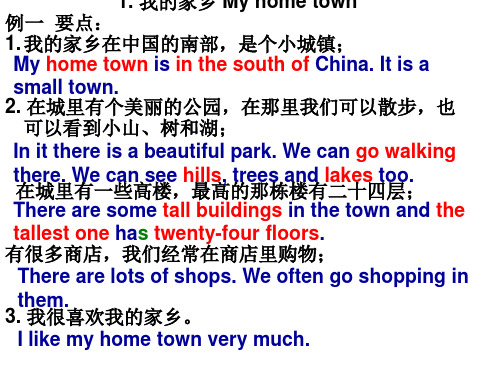
5. 推荐 Recommendations
例一 要点: 1. 如果你在考虑去北京旅游,我推荐这本书;
If you are thinking about visiting Beijing, I recommend this book.
2. 这本书描述了在该市内的许多旅游景点,而且告诉 你有关当地的纪念品;书中有许多漂亮的照片;
例二 要点: 1. 米莉是我的同班同学,15岁,是我最好的朋友;他 住在我家隔壁,我们做朋友已经差不多5年了; Millie is my classmate. She is 15 years old. She is my best friend. She lives next door and we have been friends for almost 5 years. 2. 她高而苗条,一头长发,乐于助人; She is tall and slim, and she has long hair. She likes to help people. 3. 她长大后想当个导游,周游世界;我们将永远是最 好的朋友。 Millie wants to be a guide and travel around the world when she grows up. We will always be best friends.
例二 要点: 1. 我和父母一起住在繁华街道的一所公寓里;公寓在城市 的南部; I live with my parents in a flat on a busy street. It is in the south of the city. 2. 在我们的公寓里有一个大的客厅;晚上,我们在那里 看电视; There is a big sitting room in our flat. In the evening, we watch TV there. 3. 我喜欢烹饪,经常在厨房帮妈妈做饭; I like cooking and I often help my mother make dinner in the kitchen. 4. 我的卧室有一个阳台,我喜欢坐在那儿听音乐。 My bedroom has a balcony. I like sitting there and listening to music.
2013年全国英语学科新课标版《考试大纲》、《考试说明》解读及复习建议
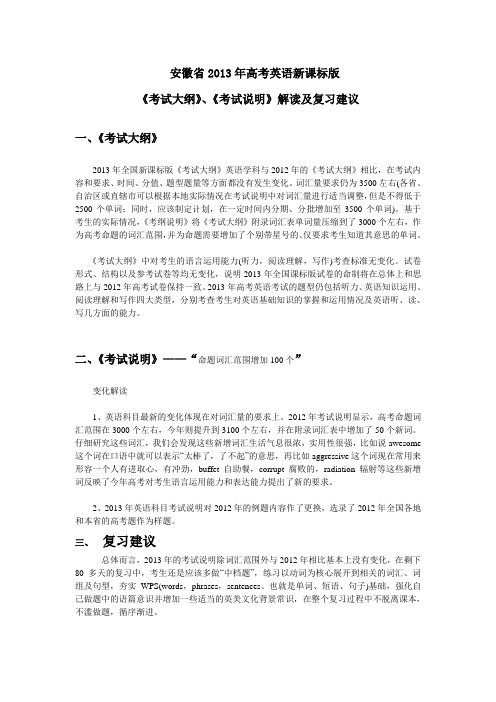
安徽省2013年高考英语新课标版《考试大纲》、《考试说明》解读及复习建议一、《考试大纲》2013年全国新课标版《考试大纲》英语学科与2012年的《考试大纲》相比,在考试内容和要求、时间、分值、题型题量等方面都没有发生变化。
词汇量要求仍为3500左右(各省、自治区或直辖市可以根据本地实际情况在考试说明中对词汇量进行适当调整,但是不得低于2500个单词;同时,应该制定计划,在一定时间内分期、分批增加至3500个单词)。
基于考生的实际情况,《考纲说明》将《考试大纲》附录词汇表单词量压缩到了3000个左右,作为高考命题的词汇范围,并为命题需要增加了个别带星号的、仅要求考生知道其意思的单词。
《考试大纲》中对考生的语言运用能力(听力,阅读理解,写作)考查标准无变化。
试卷形式、结构以及参考试卷等均无变化,说明2013年全国课标版试卷的命制将在总体上和思路上与2012年高考试卷保持一致。
2013年高考英语考试的题型仍包括听力、英语知识运用、阅读理解和写作四大类型,分别考查考生对英语基础知识的掌握和运用情况及英语听、读、写几方面的能力。
二、《考试说明》——“命题词汇范围增加100个”变化解读1、英语科目最新的变化体现在对词汇量的要求上。
2012年考试说明显示,高考命题词汇范围在3000个左右,今年则提升到3100个左右,并在附录词汇表中增加了50个新词。
仔细研究这些词汇,我们会发现这些新增词汇生活气息很浓,实用性很强,比如说awesome 这个词在口语中就可以表示“太棒了,了不起”的意思,再比如aggressive这个词现在常用来形容一个人有进取心,有冲劲,buffet 自助餐,corrupt 腐败的,radiation辐射等这些新增词反映了今年高考对考生语言运用能力和表达能力提出了新的要求。
2、2013年英语科目考试说明对2012年的例题内容作了更换,选录了2012年全国各地和本省的高考题作为样题。
三、复习建议总体而言,2013年的考试说明除词汇范围外与2012年相比基本上没有变化,在剩下80多天的复习中,考生还是应该多做“中档题”,练习以动词为核心展开到相关的词汇、词组及句型,夯实WPS(words,phrases,sentences。
2013职称英语考试时间

2013职称英语考试时间考试时间安排根据最新的官方通知,2013职称英语考试时间已经确定,考试将在以下日期内进行:•第一阶段考试:5月1日至5月7日•第二阶段考试:9月1日至9月7日•第三阶段考试:11月1日至11月7日考试科目职称英语考试共分为四个科目,分别是:1.英语语法与词汇2.阅读理解3.综合应用能力4.写作能力每个科目的考试内容及要求如下:英语语法与词汇本科目主要测试考生对英语语法和词汇的掌握程度。
考试内容涵盖英语词汇的理解、用法,以及常见语法规则等。
考试形式为选择题,共计100道题目,考试时间为90分钟。
阅读理解本科目主要测试考生的阅读能力和理解能力。
考试内容包括英语文章的阅读理解和对文章中关键信息的把握。
考试形式为选择题,共计80道题目,考试时间为60分钟。
综合应用能力本科目主要测试考生综合应用英语知识解决实际问题的能力。
考试内容涵盖听力、口语和写作等方面。
考试形式为综合题型,包括听力理解、口语表达和写作综合能力等,考试时间为120分钟。
写作能力本科目主要测试考生的英语写作能力。
考试要求考生根据题目要求,写一篇短文或一封信件。
考试形式为写作题,考试时间为60分钟。
注意事项•考生需提前提交报名材料,确保报名成功。
•考试地点将在考前通过短信和邮件通知考生。
•考生需按时参加考试,迟到将不得进入考场。
•考试期间,所有考生需携带有效身份证件和准考证,方可参加考试。
以上是关于2013职称英语考试时间的相关信息。
考生们请注意时间安排,合理安排备考时间,并合理安排作息,以提高备考效果。
祝愿各位考生都能取得优异的成绩!。
口语考试话题 收集Clear your plate campaign

Clear your plate campaignClean Your Plate Campaign 光盘行动光盘就是吃光盘中饭菜的意思。
2013年1月,北京一家民间公益组织发起“光盘行动”(Clear your plate campaign)No-waste lunch: China's "Clean Your Plate"• campaigThe central and local governments promoted a policy of thrift in the run-up to the 2013 Spring Festival, and many people joined the “clear your plate” campaign.Many restaurants have also adopted effective measures to reduce food waste, including providing half-portioned dishes at discounted prices.After a lunch with the organizers of China's "Clean Your Plate" campaign, the plates are almost - but not quite - clean. Agriculture is a big contributor to climate change, and yet globally, roughly 1/3 of food is wasted.“China is rich now, people finally have something to spend,” he says. “The other thing is China’s dining culture. If there’s something left in the plates, they have their face. They have a sense of security. If you have more than you actually need, it’s something to be proud of.”The campaigners also started posting on Weibo, China’s version of Twitter, which has some 400 million followersThe “clean your plate” campaign has received millions of mentions on Weibo, and prominent coverage in the official Party newspaper The People’s Daily, and led prime-time evening news on the government’s CCTV-1. Not bad for an idea dreamed up by a few friends around a dining table.In the months since the campaign was launched, many restaurants in Beijing and beyond have started offering smaller portions, encouraging guests to take doggy bags, and giving out certificates to those who clean their plates.Recently, "Clear Your Plate" campaign is more and more popular in society, which advocates saving against wasting. The campaign draws our attention to wasting on campus. Some students are noticed to throw away a lot of food in the canteen. As is often the case, some lights are still on with nobody in classrooms. What's more, many a student spends much money buying unnecessary items.As far as I am concerned, it's high time that we fought against wasting. Here're my suggestions. Firstly, I think our school should carry out various activities to arouse students' awareness of saving. Secondly, relevant rules and regulations are supposed to be made to punish those who waste things. Most importantly, we should form the habit of saving from now. It is everybody's duty to save resources.effort to reduce food waste. This campaign focuses on zero waste when dining in restaurants, encouraging diners to order less and take any leftover food home.Food waste on college campuses is also problematic, with over 1/3 of college cafeteria food being wasted. Students do not have refrigerators or microwaves in their rooms, so taking home “leftovers” is not an option. College undergraduates alone waste enough food to feed 10 million people annually.Of course, plate waste is not specifically a China problem, and corrupt officials are not the main culprit. In total, 30-50% of all food iswasted globally, including food waste from harvest and transportation as well as from individual consumption.Recent publicity on fake meat and dead pigs floating down rivers near Shanghai have re-focused global attention onto China’s food system, where very little seems to have improved since the melamine scandal in 2008. Concerns of food origin, safe handling practices, pesticide use and lack of standard quality assurance continue to proliferate social and mass media outlets.“The Chinese are voicing their concerns over food safety with their buying power.”This buying power is also translating into negative investor sentiment.It is universally acknowledged that the safety of food is closely related to our health.it is high time that we paid attention to this grave issue.There are several reasons for this several problem.First and foremost,some products, to huge profits,make fake commodities or products of poorquality.Inaddition,themonitorrole of laws and regulations has not been implemented in a strict st but not leastthe public especially customers from poor families,are not alert enough to the safety offood.People can not live without food every day, so food safety becomes our top concern naturally.our government is very concerned about food safety. In recent years, it has passed laws and regulations on food safety and special offices were established to oversee the food safety problems. Also, as consumers, our efforts will be a good contribution to eliminate these problems, too. Only when food safety isn’t a troublesome thing any more, can we have a bright future.Tuhao and the rise of Chinese blingTuhaoA new word has suddenly become wildly popular in China - "tuhao" - which loosely translated means "nouveau riche". There have been more than 100 million references to the word "tuhao" on social media since early September. In Chinese "tu" means earth, and "hao" means rich. To say someone is tuhao is to imply they come from a poor peasant background, and have made it rich quick - but don't quite have the manners, or sophistication to go along with it.It's like the term "nouveau riche", says Professor Steve Tsang at the School of Contemporary Chinese Studies in Nottingham - but has even more negative connotations, suggesting a certain vulgarity.汉语中"土"是地的意思,"豪"就是有钱.说某某是土豪,那就是这人出身低贱,突然发了大财,举止不得体,心中无城府.诺丁汉大学现代汉语研究学院的Steve Tsang教授说,土豪和暴发户差不多,但是贬义更浓,含粗鄙之意.This new usage of the term took off in September after a widely-shared joke about a rich, but unhappy man, who goes to a Buddhist monk for advice, expecting to be told to live a more simple life. The monk replies instead with the phrase: "Tuhao, let's be friends!"A young man asks a Zen master, "I'm wealthy, but unhappy. What should I do?" The Zen master says, "Define 'wealthy.'" The young man answers, "I have millions in the bank and three apartments in central Beijing. Is that wealthy?" The Zen master silently holds out a hand. The young man says: "Master, are you telling me that I should be thankful and give back?"The Zen master says, "No ... Tuhao, can I become your friend?"今年九月流行一个段子,说一个郁郁寡欢的有钱人想过简单的生活,于是问道一和尚.不成想这和尚却说:"土豪,我们做朋友吧!"于是该词便有了新用法.the most popular use, the new gold iPhone 5s is now known in China as the "tuhao gold iPhone 5s."The new gold iPhone 5s, which has become a huge seller in China, is now called "Tuhao Gold." it is being widely used by netizens to poke fun at the rich who are like luxurious products with little use or content."Chinese internet users are highly creative in their use of language, and are constantly inventing, and re-inventing words as a way of getting past censorship rules, says Tsang. But in this case, its popularity seems to be down to the fact that it encapsulates China's changing society so well - many people sneer at those with wealth, but are secretly jealous, says Tsang.中国网民们实在太有才了,把汉字用得妙趣横生,他们不断造词或者给旧词赋上新意以逃过审查,Tsang教授说.不过,具体到土豪这个词,它的流行生动地再现了中国当下变化中的社会: 很多人表面上嘲笑有钱人,心里却十分艳羡.裸官:naked officials"这些年,中国出了许多“裸官”,当然不是说他们不穿衣服,而是指一些贪官把存款、妻儿都安排到国外,准备逃亡他国。
口语测试安排表
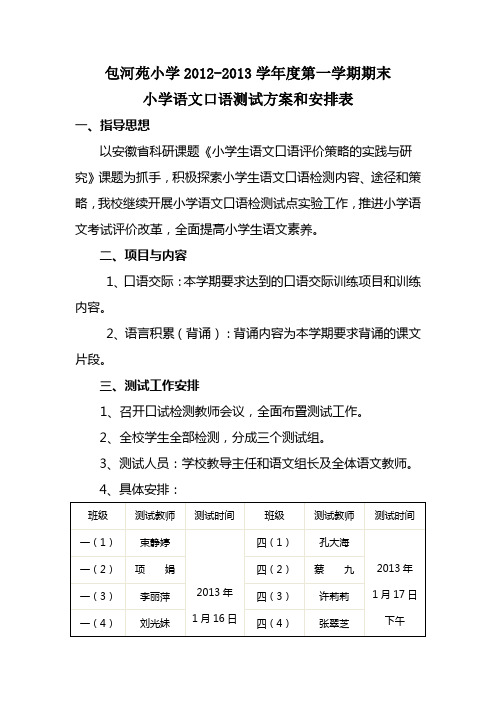
2、语言积累(背诵):背诵内容为本学期要求背诵的课文片段。
三、测试工作安排
1、召开口试检测教师会议,全面布置测试工作。
2、全校学生全部检测,分成三个测试组。
3、测试人员:学校教导主任和语文组长及全体语文教师。
4、具体安排:
班级测Βιβλιοθήκη 教师测试时间班级测试教师
测试时间
一(1)
束静婷
2013年
1月16日
下午
四(1)
孔大海
2013年
1月17日
下午
一(2)
项娟
四(2)
蔡九
一(3)
李丽萍
四(3)
许莉莉
一(4)
刘光妹
四(4)
张翠芝
二(1)
许华宏
四(5)
陶庆荣
二(2)
邓丽霞
五(1)
孙劲松
2013年
1月18日
下午
二(3)
刘倩倩
五(2)
殷卫东
二(4)
高琴
五(3)
包河苑小学2012-2013学年度第一学期期末
小学语文口语测试方案和安排表
一、指导思想
以安徽省科研课题《小学生语文口语评价策略的实践与研究》课题为抓手,积极探索小学生语文口语检测内容、途径和策略,我校继续开展小学语文口语检测试点实验工作,推进小学语文考试评价改革,全面提高小学生语文素养。
二、项目与内容
方宇芳
三(1)
张云兰
2013年
1月17日
下午
五(4)
朱芳
2013年
1月18日
下午
三(2)
陆翠平
六(1)
成人高等教育本科生学士学位英语水平考试大纲(非英语专业)(2013年5月)
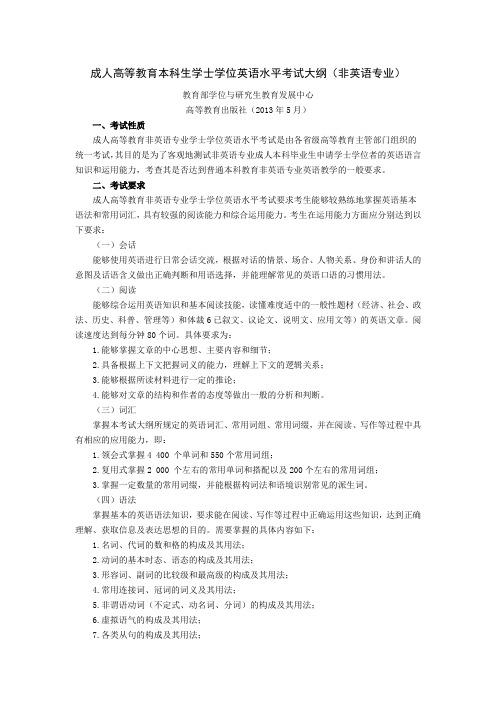
成人高等教育本科生学士学位英语水平考试大纲(非英语专业)教育部学位与研究生教育发展中心高等教育出版社(2013年5月)一、考试性质成人高等教育非英语专业学士学位英语水平考试是由各省级高等教育主管部门组织的统一考试,其目的是为了客观地测试非英语专业成人本科毕业生申请学士学位者的英语语言知识和运用能力,考查其是否达到普通本科教育非英语专业英语教学的一般要求。
二、考试要求成人高等教育非英语专业学士学位英语水平考试要求考生能够较熟练地掌握英语基本语法和常用词汇,具有较强的阅读能力和综合运用能力。
考生在运用能力方面应分别达到以下要求:(一)会话能够使用英语进行日常会话交流,根据对话的情景、场合、人物关系、身份和讲话人的意图及话语含义做出正确判断和用语选择,并能理解常见的英语口语的习惯用法。
(二)阅读能够综合运用英语知识和基本阅读技能,读懂难度适中的一般性题材(经济、社会、政法、历史、科普、管理等)和体裁6已叙文、议论文、说明文、应用文等)的英语文章。
阅读速度达到每分钟80个词。
具体要求为:1.能够掌握文章的中心思想、主要内容和细节;2.具备根据上下文把握词义的能力,理解上下文的逻辑关系;3.能够根据所读材料进行一定的推论;4.能够对文章的结构和作者的态度等做出一般的分析和判断。
(三)词汇掌握本考试大纲所规定的英语词汇、常用词组、常用词缀,并在阅读、写作等过程中具有相应的应用能力,即:1.领会式掌握4 400 个单词和550个常用词组;2.复用式掌握2 000 个左右的常用单词和搭配以及200个左右的常用词组;3.掌握一定数量的常用词缀,并能根据构词法和语境识别常见的派生词。
(四)语法掌握基本的英语语法知识,要求能在阅读、写作等过程中正确运用这些知识,达到正确理解、获取信息及表达思想的目的。
需要掌握的具体内容如下:1.名词、代词的数和格的构成及其用法;2.动词的基本时态、语态的构成及其用法;3.形容词、副词的比较级和最高级的构成及其用法;4.常用连接词、冠词的词义及其用法;5.非谓语动词(不定式、动名词、分词)的构成及其用法;6.虚拟语气的构成及其用法;7.各类从句的构成及其用法;8.基本句型的结构及其用法;9.强调句型的结构及其用法;10.常用倒装句的结构及其用法。
2013中考英语口语考试训练
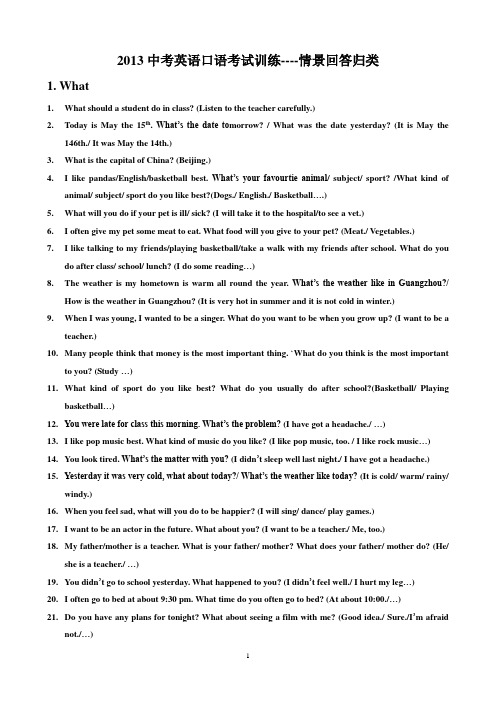
2013中考英语口语考试训练----情景回答归类1. What1.What should a student do in class? (Listen to the teacher carefully.)2.Today is May the 15th. What’s the date to morrow? / What was the date yesterday? (It is May the146th./ It was May the 14th.)3.What is the capital of China? (Beijing.)4.I like pandas/English/basketball best. What’s your favourtie animal/ subject/ sport? /What kind ofanimal/ subject/ sport do you like best?(Dogs./ English./ Basketball….)5.What will you do if your pet is ill/ sick? (I will take it to the hospital/to see a vet.)6.I often give my pet some meat to eat. What food will you give to your pet? (Meat./ Vegetables.)7.I like talking to my friends/playing basketball/take a walk with my friends after school. What do youdo after class/ school/ lunch? (I do some reading…)8.The weather is my hometown is warm all round the year. What’s the weather like in Guangzhou?/How is the weather in Guangzhou? (It is very hot in summer and it is not cold in winter.)9.When I was young, I wanted to be a singer. What do you want to be when you grow up? (I want to be ateacher.)10.Many people think that money is the most important thing. `What do you think is the most importantto you? (Study …)11.What kind of sport do you like best? What do you usually do after school?(Basketball/ Playingbasketball…)12.You were late for class this morning. What’s the problem? (I have got a headache./ …)13.I like pop music best. What kind of music do you like? (I like pop music, too. / I like rock music…)14.You look tired. What’s the matter with you? (I didn’t sleep well last night./ I have got a headache.)15.Yesterday it was very cold, what about today?/ What’s the weather like today? (It is cold/ warm/ rainy/windy.)16.When you feel sad, what will you do to be happier? (I will sing/ dance/ play games.)17.I want to be an actor in the future. What about you? (I want to be a teacher./ Me, too.)18.My father/mother is a teacher. What is your father/ mother? What does your father/ mother do? (He/she is a teacher./ …)19.You didn’t go to school yesterday. What happened to you? (I didn’t feel well./ I hurt my leg…)20.I often go to bed at about 9:30 pm. What time do you often go to bed? (At about 10:00./…)21.Do you have any plans for tonight? What about seeing a film with me? (Good idea./ Sure./I’m afraidnot./…)22.Our English teacher is very nice. What about yours? (He/She is very kind..)2. Where1.I was born in Beijing. Where were you born? (I was born in Guangzhou.)2.My parents decided to travel to Hainan with me this summer vocation. Where would you like to go?(I’d like to go to Guangzhou/Shenzhen./…)3.Excuse me, Where is the nearest supermarket?/ can you tell me where the nearest supermarket is?/Which is the way to the nearest supermarket?(Go down this road, It is on your right.)4.Tom is from England. Where are you from? (China.)3. When1.When were you born? (I was born on May the 16th, 1995)2.When is your birthday? (My birthday is May the 16th.)3.January 1st is New Year’s Day. When is Christmas Day? (December 25th.)4.I usually get up at 7:00 in the morning. When do you usually get up in the morning? (At about6:15a.m.)4. Why1.We’ll go boating this Sunday. Why not join us? (That’s a good idea!)2.You look bored. Why don’t we go shopping? (That’s a good idea!/ Ok, let’s go.)3.Why are you late for school? (Because my bike was broken./ …)5. Which1.Which sport are you good at, basketball, football or tennis? (I am good at basketball./ …)2.Which countries have larger population than any other country in the world? (China…)3.Let’s have a drink. I’m going to have a hot coffee. Which would you prefer, milk or cola? (I prefermilk.)6. How1.Many people like having sports every day? How do you like having sport?/ What do you think ofhaving sort every week? (It is good….)2.Tom’s pet dog is very beautiful. How do you like your pet?/ What do you think of your pet? (It’s verycute….)3.The doctor said you had a bad cold yesterday. How are you feeling today?/ How are you today? (I amfine. Thanks/ Thank you.)4.How do you feel if you are going to stay in a new city? (I will feel excited….)5.When I was a student, I walked to school. How do you go to school every day? (I go to school on foot/by bus…)6.I’m going to the Tianhe Bookstore Centre. Can you tell me how to get there? (Sorry, I am new heretoo.)7.I am 160cm. How tall are you?/ What is your height? (I am 162 cm.)8.I am 60 kilos. How heavy are you?? What is your weight? (I am 55 kilos.)7. How often1.How often do you have a class meeting? (…once a week.)2.My teacher told us to have sports every day. How often do you have sports? (…twice a week.)3.Don’t watch TV too much. How often do you watch TV? (…everyday./ …two times a week.)4.I have been to Beijing once. How many times have you been there? (Never./ Once./ Twice….)8. How many1.There are ten players in a team in a basketball match. How many players are there in a team in afootball match? (There are 22.)2.We go to school five days a week. How many days do you go to school every week? (I go to school fivedays a week.)3.How many P.E classes do you have every week? (I have 2 P.E. classes every week.)4.How many seasons are there in a year? What are they? (There are 4 seasons in a year. They are spring,summer, autumn and winter.)5.How many months are there in a year? What are they? (There are 12 months in a year. They areJanuary, February, March, April, May, June, July, August, .September, October, November and December.)6.How many days are there in a week? What are they? (There are 7 days in a week. They are Sunday,Monday, Tuesday, Wednesday, Thursday, Friday and Saturday.)7.Allan can speak five languages. How many languages can you speak? What are they? (Two, Chineseand English.)9. How much1.How much is the meat/ are the apples? (It is/ They are 15 yuan.)2.How much meat do you like? (Two kilos, please.)10. How farOh, dear. You are late again. How far is it from your home to the school? (It is ten-minute’s walk./ It is 2 kilometers away.)11. How long1.Your English is very good. How long have you studied English? (I have studied English for 6 years.)2.How long have you been a middle school student? (…for three years.)12.How soonI heard that you were going to Shanghai. How soon will you be back? (In two weeks.)13.whoI like Michael Jackson very much. Who is your favorite pop singer? (Jay Chou …)14.其他类型回答为:That’s a good idea.的有以下类型:1.Let’s go to the theatre tonight.2.The weather is so nice. Shall we go out for a walk?3. Jack asks, “Why don’t we go and playing basketball now?” What will you say if you want to?表示感谢和回应感谢的有以下类型:1.Your friend says Happy Birthday to you./ Here is your birthday present. (Thanks!/Thank you!)2.I heard that you won the competition (again). Congratulations! (Thank you.)3.You have done a very good job. (Thank you very much.)4.Please help yourself to some drink. (Thank you) (Thanks, but I’m full)5.Would you like some orange juice? (Yes, I’d love to./ No, thanks.)6.Thank you for helping me so much/ with my English project. (You’re welcome./ It’s my pleasure.)7.Thank you for helping me so much! (It’s my pleasure.)表示祝福的有以下类型:1.I’m going for a spoken English competition/ exam/ test tomorrow morning. (Good luck.)2.I will take part in a match/ competition/ exam/ test next week. (Good luck.)3.Today is my birthday/ Lily’s birthday./ What should you say to your friend on his birthday? (HappyBirthday!)表示歉意和回答的有以下类型:1.You lost my MP3 players./ I failed the exam again. (I am sorry to hear that.)2.Excuse me, sir. Smoking is not allowed here. (Sorry. I won’t do that again.)3.If you are late for school, what will you say to your teacher?(Sorry, I am late.)4.Sorry, I forgot to bring the book. (Never mind. / It doesn’t matter.)5.Oh, I am sorry. I took your umbrella by mistake. (It doesn’t matter.)6.I am sorry. I broke a glass just now. (It doesn’t matter)7.Lily was ill yesterday./ Lily’s foot hurt yesterday./ I am sick today. (I am sorry to hear that.)其余归类1.Have you got a mobile phone?/ D o you have a mobile phone?(Yes, I have./ No, I haven’t// Yes, I do./ No,I don’t.)2.If your friend doesn’t feel well, what would you say to him/her?(What’s the matter?/What’s wrong?)3.Your classmate thinks that Sichuan food is better than Cantonese food. What is your opinion?(I agree./I don’t agree. In my opinion, Cantonese food is better.)4.(I think) Eating more vegetables is good for our health.(I agree./ I don’t agree.)5.Your teacher tells you to do more exercise, doesn’t she? (Yes, she does.)6.I’m so worried about tomorrow’s English exam. (Relax. You are the best./ Take it easy.)7.Do you mind my opening the window? (Certainly not.)三、说话。
2013年中国青少年英语能力大赛

2013年中国青少年英语能力大赛全国总决赛项目说明一、组别说明2013年第四届中国青少年英语能力大赛全国总决赛青少组共分五个组别,分别是小学A组(小学一、二年级)、小学B组(小学三、四年级)、小学C组(小学五、六年级)、初中组和高中组。
二、个人项目说明(一) 小学A组项目根据年龄,小学A组项目有别于其他四个组别。
小学A组个人项目全部为现场口试,总分100分:快速拼读25分、英语模仿20分、英语故事+口语交流30分、看图说话25分。
1. 快速拼词比赛比赛形式:见词认读+听音拼词。
正确即得分。
见词认读15分,听音拼词10分。
试题范围:课标二级内符合常见读音规则的词汇100%,以单音节词为主,少量的双音节词。
2. 英语模仿比赛此项目为2013年小学组新增比赛项目。
设置此项目,旨在鼓励初级英语学习者英语学习过程中模仿正确语音。
选手的语音模仿与原声的符合度是最重要的评判标准。
比赛形式:提前准备,比赛现场评委用点读笔点读,选手模仿。
题目范围:《外研社英语分级阅读——丽声经典故事屋(第三级)》的四个故事。
评委会任意选点其中内容,选手现场进行模仿。
3. 英语故事比赛比赛形式:提前准备英语故事,现场讲述+与评委口语交流。
故事讲述20分,口语交流10分。
题目范围:《外研社英语分级阅读——丽声经典故事屋(第三级)》的四个故事。
选手可在其中任选一个故事进行准备,可以根据故事图片复述或朗读故事,也可以在忠实于原故事的基础上稍做改编,加一些衔接过渡性语言进行故事讲述。
时间把握在二分钟以内。
评委会根据故事的内容、故事书的图画进行2-3个问题的提问,选手回答评委问题并做简单交流。
4. 看图说话比赛形式:根据所抽到的图片看图说话,可忠实描述原图,也可根据所给图片进行想象,编故事。
题目范围:课标一级范围话题情境。
好的看图说话应该是:能尽可能使用不同的句型进行描述,除了对图的描述之外,应有简单的情感表达,如喜好、简单评判等。
如能不限于图片,就图片内容发挥想像,创意性地说故事等会得到较好分数。
2013英语口语成绩
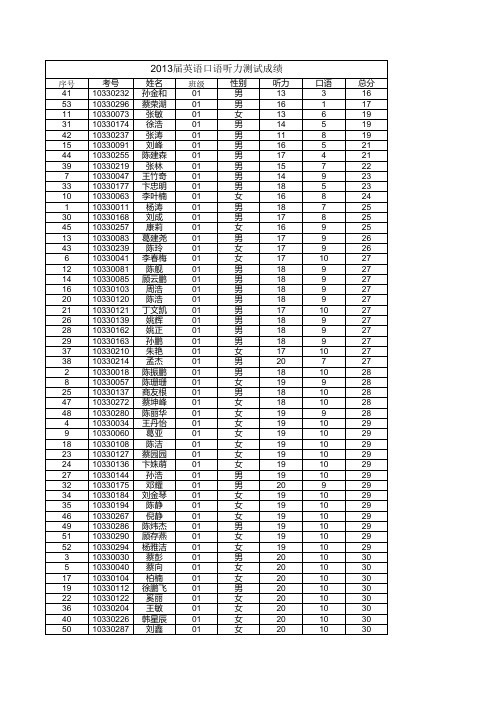
2013届英语口语听力测试成绩
序号 1 2 3 4 5 6 7 8 9 10 11 12 13 14 15 16 17 18 19 20 21 22 23 24 25 26 27 28 29 30 31 32 33 34 35 36 37 38 39 40 41 42 43 44 45 46 47 48 49 50 51 52 53 考号 10330008 10330012 10330017 10330022 10330027 10330033 10330035 10330042 10330046 10330048 10330064 10330066 10330068 10330069 10330070 10330076 10330078 10330079 10330089 10330095 10330105 10330124 10330126 10330134 10330138 10330151 10330156 10330158 10330160 10330167 10330176 10330185 10330198 10330200 10330205 10330206 10330227 10330233 10330240 10330247 10330253 10330256 10330262 10330266 10330269 10330270 10330271 10330273 10330277 10330291 10330310 10330313 10330316 姓名 陈玉婷 许可 张栋 朱健 张兵 陈春虎 陈赓 王建平 卞建东 蔡亚楠 刘璐 孙群旭 王蓓 王璐 严思南 柏凡 蔡金辉 蔡寅龙 刘宝海 王涛 黄璐 王迪 顾金男 唐晓燕 刘嘉敏 房辉 张文康 陈港庆 孙林 孙浩 陈新 李悦 张连娣 蔡羽 卞旭东 刘欣 任悦 张浩 朱婷婷 陈忠 陈伟荣 丁秀存 李林燕 张秋婷 李星 周宇 程才华 杨丽 孙露萍 刘悦 柏婷 王玥 李婷 班级 04 04 04 04 04 04 04 04 04 04 04 04 04 04 04 04 04 04 04 04 04 04 04 04 04 04 04 04 04 04 04 04 04 04 04 04 04 04 04 04 04 04 04 04 04 04 04 04 04 04 04 04 04 性别 女 女 男 男 男 男 男 女 男 男 女 女 女 女 女 男 男 男 男 男 女 男 男 女 女 男 男 男 男 男 男 女 女 女 男 男 女 男 女 男 男 男 女 女 男 女 男 女 女 女 女 女 女 听力 17 18 16 19 20 18 17 19 19 4 20 18 19 17 17 18 18 18 15 14 19 14 19 15 19 17 20 20 19 20 16 19 18 18 12 19 17 14 20 15 13 18 18 19 16 20 20 16 18 17 19 17 18 口语 9 9 9 10 10 10 10 10 10 5 10 9 10 9 10 10 9 8 9 9 10 8 9 9 10 1 10 10 9 10 4 10 10 8 9 10 10 9 10 4 7 7 10 10 8 10 10 10 10 10 9 9 9 总分 26 27 25 29 30 28 27 29 29 9 30 27 29 26 27 28 27 26 24 23 29 22 28 24 29 18 30 30 28 30 20 29 28 26 21 29 27 23 30 19 20 25 28 29 24 30 30 26 28 27 28 26 27
- 1、下载文档前请自行甄别文档内容的完整性,平台不提供额外的编辑、内容补充、找答案等附加服务。
- 2、"仅部分预览"的文档,不可在线预览部分如存在完整性等问题,可反馈申请退款(可完整预览的文档不适用该条件!)。
- 3、如文档侵犯您的权益,请联系客服反馈,我们会尽快为您处理(人工客服工作时间:9:00-18:30)。
二级笔试题型基本同一级,其中本部15选10为所讲A篇原文段落(新区10选10)
词汇翻译部分:本部选自新视野网站相应单元A篇和B篇Detailed Reading ——Words and Expressions 部分的4、6级内词汇例句,要求翻译出原词或词组。
新区选自A篇课后原题。
二级口语考试
时间:15、16周随堂
范围:视听说课本第二册1-7单元
内容:
Part 1:Retelling
学生听一个选自听说课本1-7单元第五部分Let’s Talk材料,听两遍同时提醒学生记录要点——准备2分钟——进行复述并录音
音频材料可从听说课本配套光盘上复制(近期会上传公共邮箱)。
Part 2:Answering one question
教师当堂提问一个与1-7单元主题相关的问题, 学生回答至少1分钟,以下话题仅供参考:Unit1:
1, What type of music do you prefer, and why?
2, How can music affect people’s life?
Unit 2:
1, Talk about your favorite movie: Which do you like best, action movies, comedies, horror movies, or cartoons? Chinese movies or foreign movies? contemporary movies or classic movies? Why?
2, Make comments on an impressive movie.
Unit 3:
1, What do you think are the standards for looking for a girlfriend or a boyfriend?
2, The best ways to find your true love.
Unit 4
1, Do you buy things according to what ads say? Why or why not?
2, The influence of ads.
Unit 5
1, Why do people keep pets?
2, Do you/Did you ever raise any pets? Please tell your story.
Unit 6
1, What do you think of wearing very fashionable clothes?
2, How is fashion decided?
Unit 7
1, How to earn money and spend money?
2, Does money talk?
评分原则及分值:
本次评分满分按照25分计算(教师不需再进行折算)。
评分标准见表格:
注意事项:1. 可根据评分标准上下浮动,给整分;
2. 成绩应基本呈正态分布。
